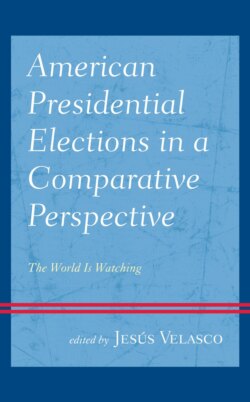Читать книгу American Presidential Elections in a Comparative Perspective - Группа авторов - Страница 27
На сайте Литреса книга снята с продажи.
China’s Views of Trump v. Clinton
ОглавлениеThere was much speculation about China’s preference between Donald Trump and Hillary Clinton. Although the Chinese government has never explicitly or implicitly revealed its preferences, China’s policy experts deliberated cautiously about the pros and cons of each candidate in terms of their potential impact on America’s China policy. Because China had more clarity about what it might get under a Clinton presidency (even if it might not like the prospects), there has been more discussion and speculation about the kind of policy that Trump would bring to China-US relations. For many Chinese experts, however, the only certainty about China policy under a Trump presidency seems to be its grave uncertainty.
Interestingly, there was quite a bit of euphoria among many Chinese scholars after Trump secured the Republican nomination. Wang Yiwei, the director of the Institute of International Affairs at China’s Renmin University, was optimistic that a Trump presidency would be good news for China-US relations because of his isolationist inclinations. Wang believed that Trump would not want the United States to bear too many global responsibilities, and as a result, there would be considerably less pressure for China in the Asia-Pacific than under a Clinton administration.36 Diao Daming also argued that Trump’s lurid accusations against China were mere campaign rhetoric and if elected, he would follow “the established path.”37 Such optimism was echoed by Eric Li, who shortly after Trump’s election declared in a New York Times op-ed that in the long term, China prefers a relationship with a United States that “doesn’t try to remake the world” according to its own values and standards. From Li’s perspective, President-Elect Trump, a “resolute businessman with little ideological underpinning,” would have little desire to ask China to follow America’s example.38
In general, there were two prevailing views among Chinese experts regarding the contrasts between Trump and Clinton’s prospective China policy. First, it was generally agreed that there would be more challenges for ChinaUS relations in regards to bilateral trade and economic relations under a Trump presidency, while Clinton would take a tougher stance against China over security and human rights issues.39 Second, it would be easier for China to deal with a Trump presidency, either because he had zero foreign policy experience, or because he was perceived as more pragmatic and flexible in contrast to Clinton’s long-standing China record.40 A few Chinese experts endorsed Clinton as a better choice for China because it was assumed that the predictability of her policy positions would lead to stability, while Trump’s unpredictability was more likely to bring volatility to the relationship between the two countries.41
It is important to note that Chinese scholars shared faith that no matter who became the next president, China-US relations would continue to make progress despite potential fluctuations at the beginning of his or her administration.42 There were two reasons behind this confidence. First, most Chinese experts believe that intertwined interests and interdependence between China and the United States are simply so overwhelming that neither side could afford any serious setback in bilateral relations. Such faith in the significance of China-US relations seems to be confirmed by China’s experience dealing with past American presidents. Historically, even those presidents who were initially committed to a hardline China policy would eventually soften their approach and engage with China in more constructive terms. For example, both Bill Clinton and George W. Bush leveled sharp criticisms at China on the campaign trail. Both shifted their positions later to foster closer ties with China, after either failing to twist China’s arms on human rights or recognizing the need to work with China on global issues such as anti-terrorism. In other words, China has confidence that US leadership transitions will not bring major structural changes to the bilateral ties. Second, as China’s power continues to grow, it will become more capable of setting the agenda and shaping the trajectory of the China-US relationship, which will be subject to less influence from American domestic politics.43 Despite China’s confidence in the resilience of the relationship, however, the presidential candidates’ practice of critiquing China over a wide range of issues reminded the Chinese about the negative elements and potential instability of the relationship.
